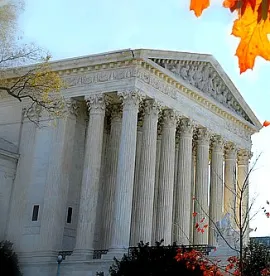On April 25, 2018, the Supreme Court of the United States heard oral argument on the legality of President Trump’s Presidential Proclamation issued on September 24, 2017, the administration’s third iteration of the travel ban, which imposes travel restrictions on citizens of Iran, Libya, North Korea, Somalia, Syria, Venezuela, and Yemen. The so-called “travel ban 3.0” was amended on April 10, 2018 to remove Chad from the list. Arguments were limited to four central questions as they pertain to the five predominantly Muslim countries subject to the travel ban.
Three of the questions focused primarily on the extent of the president’s authority over immigration matters. The government argued that the travel ban falls squarely within the powers granted to the executive branch by Congress—which allows presidents to prevent the entry of any aliens they determines would be “detrimental to the interests of the United States.” The attorney arguing on behalf of the state of Hawaii, argued that the travel ban oversteps Congress’ intention by creating what amounts to a nationality-based ban.
The fourth question asked whether the travel ban had violated the establishment clause of the U.S. Constitution by targeting predominantly Muslim countries. The challenging attorney argued on the basis of the public comments President Trump made during his presidential campaign, implying views that he and the president’s staff have “rekindled” since the start of the current administration. The government argued that President Trump’s comments during the campaign should not be considered because he was a private citizen at the time he made them and that national security information has since justified the need for the travel restrictions. In response to a question posed by Justice Alito, the challenging attorney affirmed that a “reasonable observer” could conclude that the travel ban is a “Muslim ban.”
Background
After two back-to-back rulings in October 2017 in the federal district courts of Maryland and Hawaii blocked the third version of the travel ban from going into effect, the Trump administration appealed to the Supreme Court to stay the preliminary injunctions. In December, the Supreme Court agreed to let the travel ban take effect pending the outcome of the appeals process in the circuit courts. The Ninth Circuit Court of Appeals later affirmed a preliminary injunction imposed by the Hawaii district court, prompting the Trump administration to once again appeal the case to the Supreme Court, this time for a final decision on the legality of the travel ban. A decision is expected in June.
Key Takeaways
In the meantime, employers and their foreign national employees are reminded that the travel restrictions imposed by the travel ban are in full effect. Foreign nationals from the seven affected countries risk being denied entry to the United States after any international travel. However, any foreign national from those countries who possessed a valid visa on September 24, 2017, the date of the most recent Presidential Proclamation on the travel ban, will not be subject to visa revocation.




 />i
/>i
